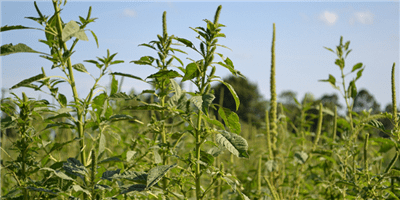WESTMINSTER, Colorado – MAY 23, 2017 – A recent survey conducted by the Weed Science Society of America (WSSA) ranks Palmer amaranth as the most troublesome and difficult to control weed in 12 categories of broadleaf crops,
Almost 200 weed scientists across the U.S. and Canada participated in the 2016 survey, the second conducted by WSSA. A 2015 baseline survey explored the most common and troublesome weeds in 26 different crops and noncrop areas.
The current survey ranks the following weeds as the most troublesome or the most common among broadleaf crops, fruits and vegetables:
|
TOP 10 WEEDS IN BROADLEAF CROPS, FRUITS & VEGETABLES |
|||
| Most Troublesome | Most Common | ||
| 1 | Palmer amaranth | 1 | common |
| 2 | common lambsquarters | 2 | foxtail (giant, green, yellow) |
| 3 | horseweed ( |
3 | morningglory ( |
| 4 | morningglory ( |
4 | Palmer amaranth |
| 5 | waterhemp (tall, common) | 5 | redroot pigweed |
| 6 | nutsedge (yellow, purple) | 6 | waterhemp (tall, common) |
| 7 | kochia | 7 | horseweed ( |
| 8 | common ragweed | 8 | common ragweed |
| 9 | giant ragweed | 9 | barnyardgrass |
| 10 | nightshade (eastern black, hairy) | 10 | velvetleaf |
Six weed species appeared on both the “most troublesome” and “most common” lists, including Palmer amaranth, common
WSSA also sorted the survey data to produce the following crop-specific results:
| BROADLEAF CROP | MOST TROUBLESOME WEED | MOST COMMON WEED |
| alfalfa | Canada thistle | dandelion |
| canola | kochia | wild oat |
| cotton | Palmer amaranth | morningglory ( |
| fruits & nuts | field bindweed | horseweed ( |
| peanuts | nutsedge (yellow, purple) | Palmer amaranth |
| pulse crops | common lambsquarters | common |
| soybeans | horseweed, |
waterhemp (tall, common) |
| sugar beets | common lambsquarters | common |
| vegetables | nutsedge (yellow, purple) | common |
Although listed as the most troublesome weed in cotton only, Palmer amaranth was ranked first in the overall survey based on the number of respondents who cited it as a problem. Common
WSSA plans to conduct habitat-specific weed surveys annually. The 2017 survey will focus on weeds in grass crops,
The 2016 survey data is posted online at http://wssa.net/wssa/weed/surveys. For more information specific to herbicide-resistant weeds, see the International Survey of Herbicide Resistant Weeds, available at http://weedscience.com.
Source: Weed Science Society of America



